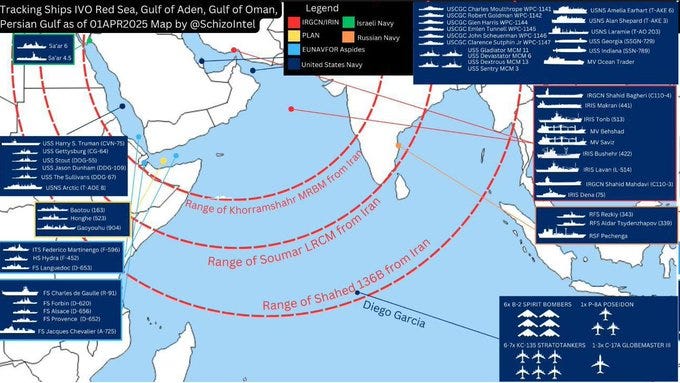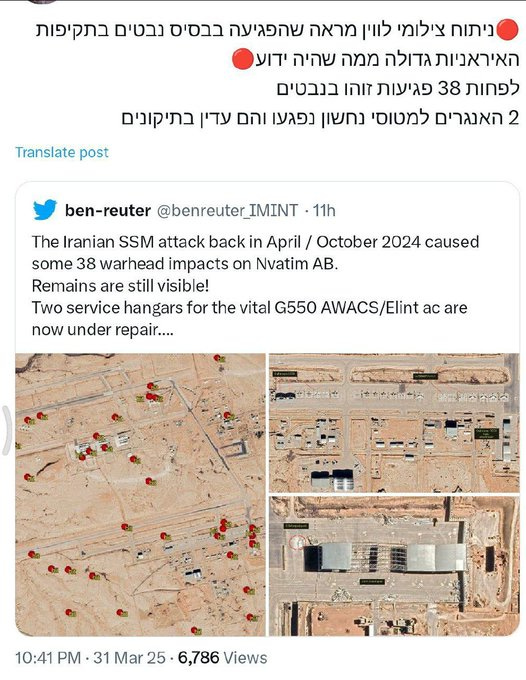The buzz from yesterday remains, well, twofold. Tariffs, but also Trump’s announcement of negotiations with Iran. The twofold news seems to have led to a wave of optimism—if Wall Street can serve as a proxy for public mood (doubtful?). Anyway, the prospects for a slip and fall remain in place. Trump continues to prosecute the genocide in Palestine begun by his mentor Zhou and continues Zhou’s war in Yemen. Am I being unkind? Isn’t that exactly what’s happening, despite Trump’s snide remarks directed at Zhou personally—but not at the war policies of the Zhou regime. In fact, Trump’s main criticism of the Zhou regime seems to be that it didn’t kill enough Houthis or Palestinians:
Prem Thakker @prem_thakker
Ex-Biden State Department official says even the Israeli military expected the US to only let them bomb Gaza for weeks, rather than unconditionally for a year and a half:
Nevertheless, we have to be grateful even for small mercies.
AmCon treats the development at some length, in a thoughtful article:
Trump Surprises the Hawks on Iran
Sitting next to a flustered Benjamin Netanyahu, the U.S. president said “direct talks” with Tehran would take place Saturday.
Yesterday my last post asked: How Do You Figure Trump? The Anglo-Zionists thought they had Trump locked into threatening Iran with war unless Iran surrendered its sovereignty to the Anglo-Zionist combine. But then Trump announced—with a dismayed Netanyahu at his side—”direct” negotiations with Iran. The important thing to understand about Trump’s move to negotiating—with continued threats—is that Trump was successful in initiating talks only because he implicitly agreed to Iran’s conditions. The talks are, from reports, only to be about Iran’s non-existent nukes, not about any surrender of sovereignty. One guess regarding the Trumpian technique here is that he deliberately escalates tensions and then surprises those who thought they controlled him in order to build up war fear in the public and thus trigger relief and support for his volte face. While also using the continuing threats to cover his volte face.
Curt Mills, the Executive Director at AmCon, comments:
The White House could easily look at what Trump’s former direct rival Nikki Haley says to do on Iran — a list of demands that will guarantee No Deal — and do the opposite
Whatever the Trumpian technique, Trita Parsi summarizes the state of affairs ably (sidenote: I remember many years ago reading, and being impressed by, Parsi’s Treacherous Alliance: The Secret Dealings of Israel, Iran, and the United States). Note Parsi’s identification of what appears to be Trump’s only red line:
There is much focus on Trump's claim that his envoys will meet with the Iranians on Saturday in "direct" talks. Though there is no confirmation from the Iranian side of a meeting on Saturday, it would be a positive development if the two parties meet, particularly if the meeting is direct. But the more important variable is one that continues to remain murky - what are the parameters of the talk sand what red lines and strategy is Trump pushing? If he seeks to dismantle the Iranian nuclear program Libya-style, in addition to closing down Iran's missile program and Tehran's relations with its regional partners, then diplomacy will most likely be dead on arrival. This strategy has been favored by the Israelis, Bolton, and Pompeo precisely because they knew it would fail. If Trump's strategy is centered on achieving a verification-based deal that prevents an Iranian bomb - his only red line - then there is reason to be optimistic about upcoming talks.
So far so good. It remains to be seen how that scales up to wider peace. The cliff edge that Trump appears to be treading along is sketched out here:
Sina Toossi @SinaToossi
As talk of diplomacy with Iran resurfaces, so do calls for military strikes.
But the idea that a “surgical strike” could solve the nuclear dispute is deeply misguided.
It’s far more likely to make things worse — fast.
Here’s why that path leads to serious escalation:
>>>
10:44 AM · Apr 9, 2025
2/ Even in the best-case scenario, a military strike would only set back Iran’s nuclear program by more than a year at best. That’s if you know where everything is (you don’t), and hit every underground, dispersed site with perfect accuracy (you won’t).
3/ Here’s the problem: You can’t confirm destruction of Iran’s nuclear program from the air. You’d need boots on the ground to verify and dismantle it. That means occupation — think Iraq 2.0, only worse. Which is politically and logistically impossible.
4/ So what would a strike actually do? It would push Iran to build a bomb. And give them international justification to do so — even from countries like China or Russia that currently oppose it. In many ways, it'll be a gift to Iran’s hardliners.
5/ What about Iran’s response? It depends on the target. A symbolic strike might get a limited reply. But if nuclear sites, refineries, or leadership are hit — expect a major retaliation. Missiles. Drones. Maritime disruption. Multi-front proxy war.
6/ Iran’s military capabilities aren’t just hype. They’ve already shown they can saturate and overwhelm missile defenses in Israel — twice — just this past year. They can also hit US bases across the region — from Iraq to the Persian Gulf.
7/ They also have a major card to play: The Strait of Hormuz. One of the world’s most vital oil chokepoints. Iran can unleash asymmetric warfare there — fast boats, drones, mines — and cause global economic shock.
8/ Yes, their regional allies are under pressure. But Iranian allies in Iraq, Lebanon, and Yemen still have enough firepower to destabilize multiple fronts. Iran will not fight like a conventional army. It will wage an attrition war, across many battlefields.
9/ Iran has been relatively restrained in the past year. Why? Because they’ve had something to lose. But once you bomb their soil, that calculation changes — and the risk of uncontrollable escalation skyrockets.
10/ The logistics for a US strike on Iran are a nightmare. No regional ally wants to host it. That leaves aircraft carriers & Diego Garcia, both far from ideal. Carriers are vulnerable to missiles & drones. And without regional bases, sustained strikes are nearly impossible.
11/ Bottom line: You can’t bomb away the Iran nuclear issue. You’ll just create a much bigger crisis and likely provoke the very thing you’re trying to prevent. This isn’t strength. It’s strategic self-sabotage. Trump seems to get it, but many warmongers around him don't.
Correct. If Trump is anything remotely resembling the stable genius he claims to be, then he understands that the Zionist strategy is to embroil the US in a war that the US can’t back out of. That can only be accomplished through massive US casualties via Iranian retaliation. Recall: Netanyahu has long claimed that the US is easily manipulated—and that he is the guy who knows how to do it.
There’s some more good news today, this time via Pew Research. Americans appear to be catching on to the reality of Israel as a genocidal terrorist state—despite the relentless hasbara:
We know that Trump avidly consumes polling data. What these comments regarding the Pew Research show, without exactly saying so, is the mind numbing fanaticism of Zionist ideologues, who are blind to the damage they’re doing not only to Israel’s reputation but to the entire Jewish brand of Jews as the world’s premier victim identity group:
Jeffrey Sachs:
Netanyahu's bet was that he could nuke Israel's reputation with Dems because lib boomers would stay loyal and meanwhile Republicans would be a rock solid constituency. Increasingly, that bet looks catastrophic.
Trita Parsi:
Israel is losing the hearts and minds of the American people at an unprecedented pace.
This explains the desperation of the pro-Israel lobby's efforts to curtail freedom of speech. But the more they try to shut Americans up, the more people will turn against Israel's policies.
Dr. Annelle Rodriguez Sheline:
The myth that American power upholds human rights lies buried beneath the rubble of Gaza.
Nevertheless, Trumpian speech suppression policy remains what it is. Regardless of whether this is part of his political judo skills, it remains a danger to our constitutional order:
Nick Cleveland-Stout @nick_clevelands
Since the Trump administration took a sledgehammer to FARA, disclosure of foreign lobbying materials is down over 30 percent compared to this time last year and over 40 percent compared to 2023.
Foreign agent disclosures already down more than 30%
After the Trump administration said it won't make enforcing the law a priority, the results are coming in
I understand that many readers will be aware of the abuses of FARA, but foreign agent disclosure is necessary to an informed American public.
Imagine being targeted simply for wanting to feed starving children.









My optimism that there will be no US attacks on Iran stems from the very key fact that what you posit as Trump's red line: no Iranian nuclear weapon; is the #1 red line of Russia. Trump and the US diplomats do not need to enforce this. Russia will. So if that is Trump's red line, working with the Russians is the very best way to achieve it.
The Libya nuclear solution ended with Khadafi killed and left soldomized. And slavery in Libya again. And destroyed the country, leaving it devastated.
Clinton on Qaddafi: "We came, we saw, he died”
I’m surprised in all the discussions of Iran taking a Libyan type deal, the Libya aftermath is not mentioned. The Libya deal destroyed the credibility of trusting a deal with the U.S., for any new administration can ignore deals made by the previous administration.
I’m surprised Iran has not gone nuclear, after all Pakistan did at little cost. Perhaps Iran believes Israel would nuke them if they did. Or they other Arab states and Turkey would go nuclear. Iran is so close to going nuclear, I assume it’s a deliberate decision not to take the final step.